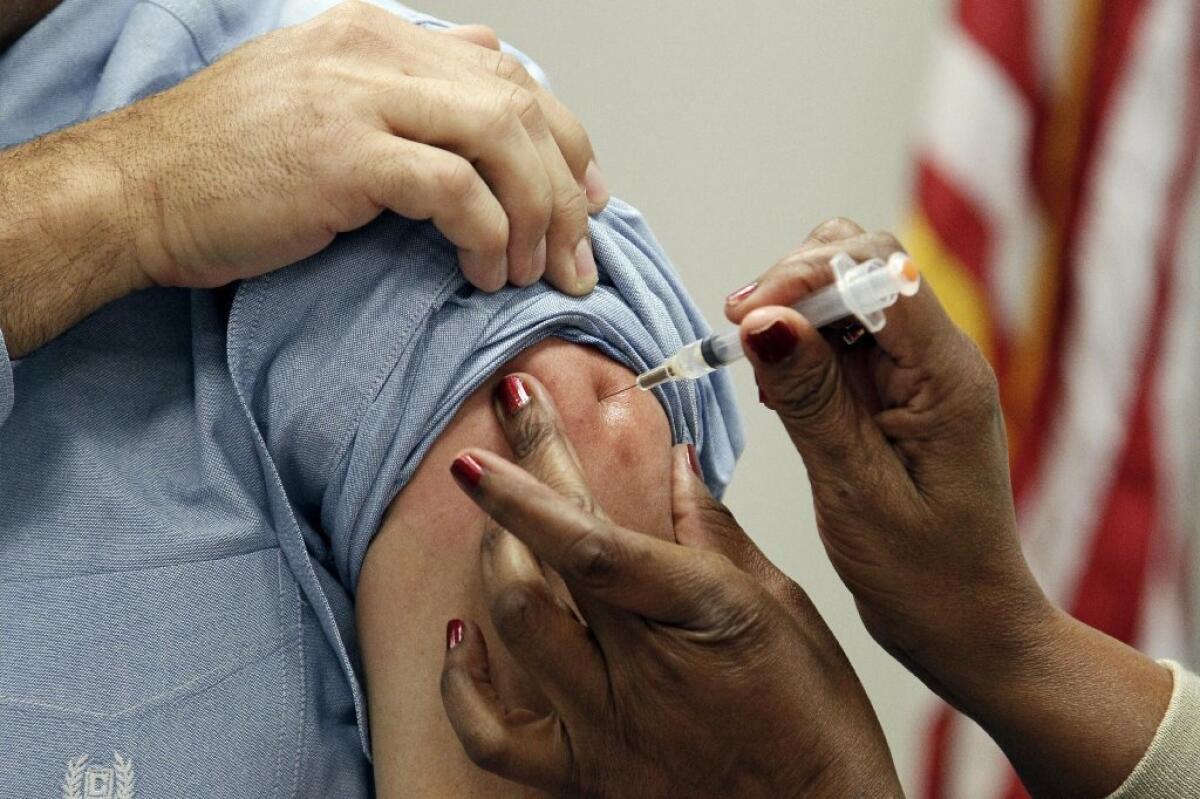Flu shots may reduce risk of heart attacks, strokes and even death

- Share via
Get a flu shot to ward off a case of influenza, and as an added bonus you’ll reduce your risk of a heart attack, stroke or other type of unpleasant “cardiovascular event,” a new study finds.
For some time, researchers have suspected that flu shots can protect heart health as well as respiratory health. They have tested this theory in a handful of clinical trials, and the results have been mixed.
Now an international group of researchers has compiled data from a dozen randomized clinical trials to see if they could get a clearer answer to the question. What they found was “a consistent association between influenza vaccination and a lower risk of cardiovascular events,” according to their report in Wednesday’s edition of the Journal of the American Medical Assn.
Five of the trials the team examined were published in peer-reviewed journals and compared a flu vaccine to a placebo vaccine or other type of control. In those trials, 3,238 patients got a real vaccine and 95 of them – 2.9% – went on to experience “a major adverse cardiovascular event,” the JAMA report said. For the sake of comparison, 3,231 patients in those trials got a placebo or control and 151 of them – or 4.7% – later had a cardiovascular event, according to the study.
That translates into a 36% reduced risk of a serious heart problem simply by getting a flu shot – something everyone over the age of 6 months should be doing anyway. Based on these figures, the researchers calculated that one death or serious illness due to heart trouble could be prevented by vaccinating 58 additional people.
Three of the trials the researchers examined focused on patients with coronary artery disease. Some of those patients had recently experienced acute coronary syndrome, and they benefited the most by getting a flu shot. Patients who got the vaccine were 55% less likely to have a serious heart problem than patients in the control groups, the researchers found. The team calculated that for these patients, only eight additional people would need to get a flu shot in order to prevent one case of death or serious illness.
When the researchers considered cardiovascular deaths on their own, they found no statistically significant difference between the 1.3% of people who died after getting a flu shot and the 1.7% who died after being assigned to a placebo or control group.
Experts aren’t sure why the flu increases the risk of serious heart problems, but they have their theories. It may cause a plaque that has built up inside the arteries to rupture, or it may cause the heart muscle to become inflamed, among other possibilities. Knowing what’s going on inside the body would help figure out who would get an extra boost from a flu shot, and why.
Even with those uncertainties, the conclusion that a flu shot can protect patients with heart disease is convincing, according to an editorial that accompanies the study in JAMA.
“The estimate of 1.7 major cardiovascular events prevented for every 100 persons with cardiovascular disease vaccinated is plausible and would represent a significant public health benefit,” wrote Dr. Kathleen Neuzil, a vaccine expert at PATH, a Seattle-based nonprofit that focuses on global health.
If you’re interested in news that helps you stay healthy, you like the things I write about. Follow me on Twitter and “like” Los Angeles Times Science & Health on Facebook.
ALSO:
It works: HPV vaccine reduces infections by 56%, CDC says
Air pollution causes lung cancer, World Health Organization says
45% of Americans got a flu shot last year; CDC says we can do better







